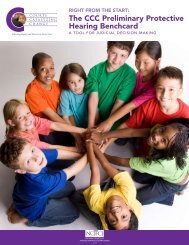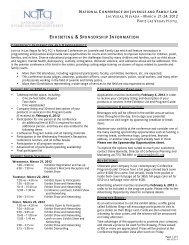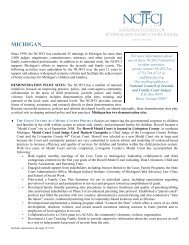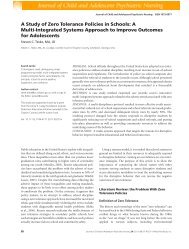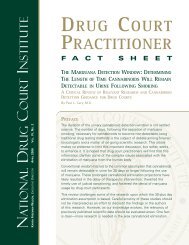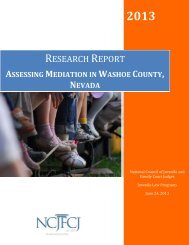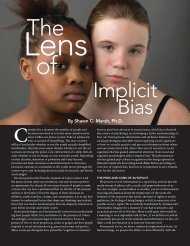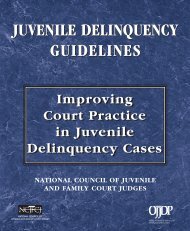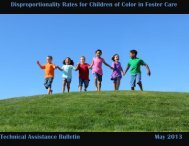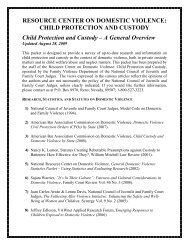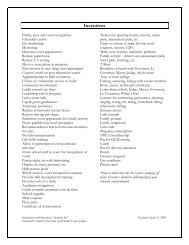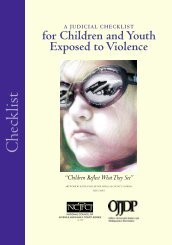dowNload - National Council of Juvenile and Family Court Judges
dowNload - National Council of Juvenile and Family Court Judges
dowNload - National Council of Juvenile and Family Court Judges
Create successful ePaper yourself
Turn your PDF publications into a flip-book with our unique Google optimized e-Paper software.
The State-Tribal ICWA Conference in Mississippi<br />
• In 1997, the New Mexico Supreme <strong>Court</strong> created the statewide<br />
Tribal-State Judicial Consortium to facilitate communication <strong>and</strong><br />
collaboration between state <strong>and</strong> tribal judges. Collaborative training<br />
has been developed on court orders, IV-E funding, <strong>and</strong> the tribal best<br />
practice <strong>of</strong> traditional adoptions. Last year, the Pueblos <strong>of</strong> Laguna<br />
<strong>and</strong> Jemez hosted regional meetings on the rights <strong>of</strong> incarcerated<br />
parents <strong>of</strong> Indian children involved in the child abuse/neglect system.<br />
Through presentations by the Children’s Law Center; tribal <strong>and</strong><br />
state judges; staff <strong>of</strong> the New Mexico Children, Youth <strong>and</strong> Families<br />
Department, New Mexico Department <strong>of</strong> Corrections, <strong>and</strong> Navajo<br />
Department <strong>of</strong> Justice; <strong>and</strong> national tribal advocates, a report was<br />
published to clarify policies, procedures, <strong>and</strong> culturally appropriate<br />
services.<br />
• Several states have strong collaborative judicial groups, such as<br />
Wisconsin <strong>and</strong> California. New groups are emerging in other states,<br />
such as Nebraska <strong>and</strong> Washington.<br />
<strong>Juvenile</strong> <strong>Court</strong> spearheaded the formation <strong>of</strong> an ICWA workgroup<br />
in the Arizona State, Tribal, <strong>and</strong> Federal Forum to improve ICWA<br />
compliance.<br />
• The Mississippi CIP is working with the Mississippi B<strong>and</strong> <strong>of</strong> Choctaw<br />
Indians to plan its 2nd Annual State-Tribal ICWA Conference<br />
<strong>and</strong> develop a collaborative ICWA curriculum. The first gathering<br />
resulted in setting priorities for state <strong>and</strong> tribal judges, caseworkers,<br />
<strong>and</strong> other system stakeholders. Mississippi has included the tribe as a<br />
valued partner on the state CIP team, enhancing a partnership based<br />
on respect <strong>and</strong> trust.<br />
• Minnesota held a series <strong>of</strong> statewide Children’s Justice Initiative Meetings,<br />
attended by nearly 1,000 judges, court administrators, attorneys,<br />
social workers, tribal representatives, <strong>and</strong> others. One <strong>of</strong> the key topics<br />
addressed was “Partnering with Tribes to Achieve Timely Permanency for<br />
Indian Children,” presented by Anita Fineday, former chief judge <strong>of</strong> the<br />
White Earth Tribal <strong>Court</strong>. The presentation helped improve state-tribal<br />
court relationships <strong>and</strong> outcomes for Indian children.<br />
Successful collaborative efforts built on respect, cooperation,<br />
<strong>and</strong> mutual responsibility will ultimately light a path toward better<br />
outcomes for Native children.<br />
The “Connecting Legacies” conference in Arizona: Judge Melvin Sto<strong>of</strong>, Pascua Yaqui<br />
Tribe; Judge Kathleen Quigley, Pima County <strong>Juvenile</strong> <strong>Court</strong>; Judge William Thorne,<br />
Utah <strong>Court</strong> <strong>of</strong> Appeals; <strong>and</strong> Caroline Lautt-Owen, Director <strong>of</strong> Dependent Children’s<br />
Services Division, Arizona Administrative Office <strong>of</strong> the <strong>Court</strong> (left to right).<br />
Collaborative Training<br />
Many issues <strong>of</strong> noncompliance with ICWA can be significantly<br />
addressed by cross-training <strong>and</strong> communication. There are a number <strong>of</strong><br />
examples <strong>of</strong> states <strong>and</strong> tribes collaborating to provide ICWA training.<br />
• This past year the Arizona CIP, in collaboration with several Arizona<br />
tribes, held a conference, “Connecting Legacies Working H<strong>and</strong><br />
in H<strong>and</strong> with ICWA,” with 300 attendees. As a result <strong>of</strong> close<br />
state-tribal relationships, Judge Kami Hart <strong>of</strong> the Gila River Indian<br />
Community <strong>and</strong> Judge Kathleen Quigley <strong>of</strong> the Pima County<br />
• Last year, the Indiana CIP invited Chief Judge Michael Petoskey <strong>of</strong><br />
the Pokagon B<strong>and</strong> <strong>of</strong> the Potawatomi Tribal <strong>Court</strong> to speak at the<br />
annual meeting <strong>of</strong> juvenile court judicial <strong>of</strong>ficers. Judge Petoskey<br />
spoke about common judicial ground <strong>and</strong> the b<strong>and</strong>’s desire to develop<br />
strong, positive, <strong>and</strong> cooperative relationships with those working in<br />
the child welfare <strong>and</strong> juvenile justice system.<br />
Tools for ICWA Performance Improvement<br />
As states <strong>and</strong> tribes move toward increasing ICWA compliance, it<br />
is imperative that tools <strong>and</strong> resources are available to collect baseline/<br />
ongoing data. Wisconsin established an ICWA review instrument<br />
called QUICWA, after completing numerous focus groups with tribal<br />
representatives about the types <strong>of</strong> issues that arose in cases involving<br />
Indian children. This consultation with focus groups was instrumental<br />
in establishing a state-specific requirement for pro<strong>of</strong> <strong>of</strong> notice to be<br />
included in the court files. These reviews have been tremendously<br />
beneficial in encouraging ICWA compliance in Wisconsin.<br />
The QUICWA Compliance Collaborative is a national consortium<br />
<strong>of</strong> Indian tribes, urban organizations, <strong>and</strong> advocacy groups who work<br />
on Indian child welfare issues using ICWA compliance data to advocate<br />
20 JUVENILE AND FAMILY JUSTICE TODAY | WINTER 2013



